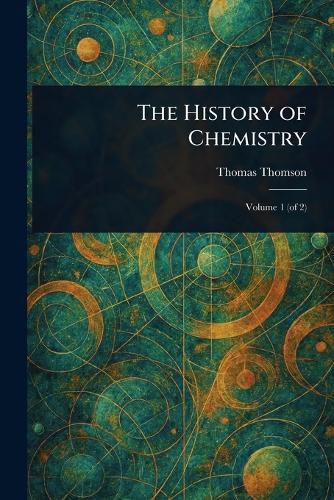Readings Newsletter
Become a Readings Member to make your shopping experience even easier.
Sign in or sign up for free!
You’re not far away from qualifying for FREE standard shipping within Australia
You’ve qualified for FREE standard shipping within Australia
The cart is loading…






This title is printed to order. This book may have been self-published. If so, we cannot guarantee the quality of the content. In the main most books will have gone through the editing process however some may not. We therefore suggest that you be aware of this before ordering this book. If in doubt check either the author or publisher’s details as we are unable to accept any returns unless they are faulty. Please contact us if you have any questions.
Delve into the origins of modern chemistry with "The History of Chemistry, Vol. 1 of 2" by Thomas Thomson. This meticulously prepared edition offers a fascinating journey through the early development of chemical science, exploring the groundbreaking discoveries and influential figures that shaped our understanding of the chemical elements and compounds.
A cornerstone of science history, this volume provides a comprehensive overview of the key concepts and experiments that laid the foundation for the field of chemistry. Explore the historical context of chemical advancements and gain valuable insights into the evolution of scientific thought.
Whether you're a student of science, a history enthusiast, or simply curious about the roots of chemistry, this volume offers a rich and informative exploration of the subject. Discover the enduring legacy of early chemists and their pivotal contributions to the world of science.
This work has been selected by scholars as being culturally important, and is part of the knowledge base of civilization as we know it.
This work is in the public domain in the United States of America, and possibly other nations. Within the United States, you may freely copy and distribute this work, as no entity (individual or corporate) has a copyright on the body of the work.
Scholars believe, and we concur, that this work is important enough to be preserved, reproduced, and made generally available to the public. We appreciate your support of the preservation process, and thank you for being an important part of keeping this knowledge alive and relevant.
$9.00 standard shipping within Australia
FREE standard shipping within Australia for orders over $100.00
Express & International shipping calculated at checkout
This title is printed to order. This book may have been self-published. If so, we cannot guarantee the quality of the content. In the main most books will have gone through the editing process however some may not. We therefore suggest that you be aware of this before ordering this book. If in doubt check either the author or publisher’s details as we are unable to accept any returns unless they are faulty. Please contact us if you have any questions.
Delve into the origins of modern chemistry with "The History of Chemistry, Vol. 1 of 2" by Thomas Thomson. This meticulously prepared edition offers a fascinating journey through the early development of chemical science, exploring the groundbreaking discoveries and influential figures that shaped our understanding of the chemical elements and compounds.
A cornerstone of science history, this volume provides a comprehensive overview of the key concepts and experiments that laid the foundation for the field of chemistry. Explore the historical context of chemical advancements and gain valuable insights into the evolution of scientific thought.
Whether you're a student of science, a history enthusiast, or simply curious about the roots of chemistry, this volume offers a rich and informative exploration of the subject. Discover the enduring legacy of early chemists and their pivotal contributions to the world of science.
This work has been selected by scholars as being culturally important, and is part of the knowledge base of civilization as we know it.
This work is in the public domain in the United States of America, and possibly other nations. Within the United States, you may freely copy and distribute this work, as no entity (individual or corporate) has a copyright on the body of the work.
Scholars believe, and we concur, that this work is important enough to be preserved, reproduced, and made generally available to the public. We appreciate your support of the preservation process, and thank you for being an important part of keeping this knowledge alive and relevant.